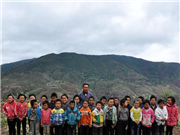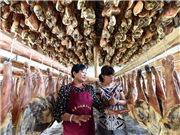

 |
| Premier Li Keqiang (front R) inspects the Industrial and Commercial Bank of China (ICBC) in Beijing, capital of China, April 17, 2015. Li made an inspection tour in ICBC and China Development Bank Friday. (Photo: Xinhua/Ding Lin) |
Chinese banks should further cut their fees and increase their loans to small businesses, Premier Li Keqiang said in a meeting with presidents of major Chinese banks and their administrators in Beijing on Friday.
Li said the banks should also dedicate more finance to development projects to foster domestic restructuring and to support cooperation with developed economies, both as a buyer of technology and expertise, and an exporter.
The premier visited China Development Bank and the Industrial and Commercial Bank of China before hosting the meeting together with Vice-Premier Ma Kai and State Councilor Yang Jing in the ICBC.
Li urged CDB to increase its support for shantytown renovation projects, including underground pipe networks; railway construction in the central and western regions; water conservancy work; and information infrastructure projects-such as improving the Internet-that are the bank's duty.
The premier's major concern with ICBC was the bank's loans for small enterprises. ICBC loaned about 161.3 billion yuan ($26.9 billion) to small enterprises last year.
Jiang Jianqing, president of ICBC, predicted that figure will drop to about 140 billion yuan this year.
Li said: "Supporting them will generate sustainable vitality in the real economy and create jobs. There could be some favorable policies, or even financial support, from government revenue when necessary, for the banks' loaning business for small enterprises."
Jiang said his bank had canceled all fees related to small-enterprise loans.
However, Li said: "That's not enough. The banks should further cut the fees in other services to relieve the burden on small businesses."
He said helping the real economy was in line with the interests of the banks. "A key reason why we actively encourage the establishment of private banks is that we hope the private banks can become an important finance service provider for small enterprises," Li said.
According to Shang Fulin, chairman of the China Banking Regulatory Commission, the commission had approved the founding of five private banks by March, and it is now processing more than 40 applications from 20 provinces, among which about 10 applications will be approved.
In the first quarter, the Chinese economy grew 7 percent year-on-year, the registered unemployment rate was 5.1 percent, and people's income grew at 8.1 percent.
But industry's profit dropped 4.2 percent and imports fell 17.3 percent.
In the meeting, Li shared his views on the banking industry's role during the transitional stage of the economy.
"The real economy is like the body, and the finance sector is like the blood. The problem with the Chinese finance sector is not anemia, but poor circulation of the blood," he said.
The banks should make good use of their funds through more reforms and innovations based on the Internet and by increasing the finance services' efficiency in supporting infrastructure construction, Li said.
He said he strongly supported a suggestion from Liu Shiyu, president of the Agricultural Bank of China, that the government should lower taxes on imported large-scale agricultural machinery for agricultural financial leasing companies. The premier urged the ABC to strengthen its financial services for grassroots farmers.
"There should be more banks appearing in the rural financial market to create reasonable competition and let the farmers have more options," Li said.
Day|Week

 Tsinghua junior makes over 10,000 yuan a day by selling alumnae's used quilts
Tsinghua junior makes over 10,000 yuan a day by selling alumnae's used quilts Graduation photos of students from Zhongnan University
Graduation photos of students from Zhongnan University A school with only one teacher in deep mountains
A school with only one teacher in deep mountains Glimpse of cultural heritage "Xilankapu"
Glimpse of cultural heritage "Xilankapu" Homemade cured hams in SW China
Homemade cured hams in SW China Breathtaking buildings of W. Sichuan Plateau
Breathtaking buildings of W. Sichuan Plateau Graduation photos of "legal beauties"
Graduation photos of "legal beauties" Top 10 most expensive restaurants in Beijing in 2015
Top 10 most expensive restaurants in Beijing in 2015